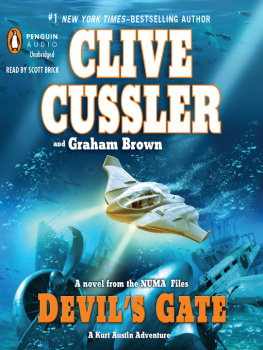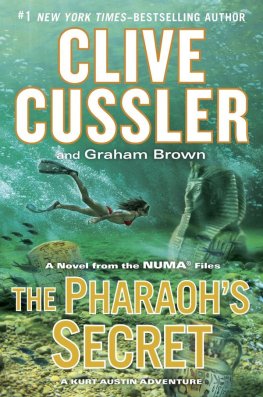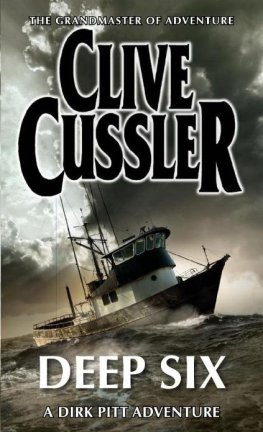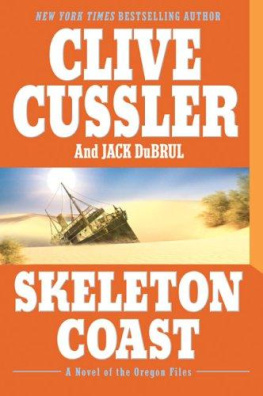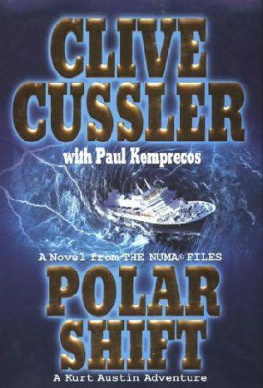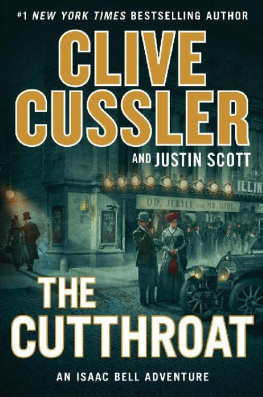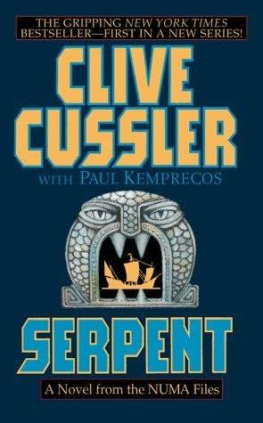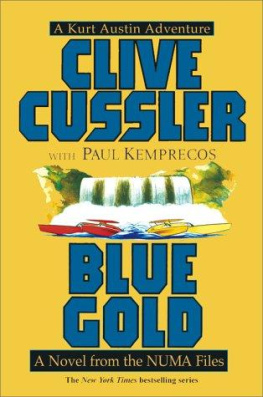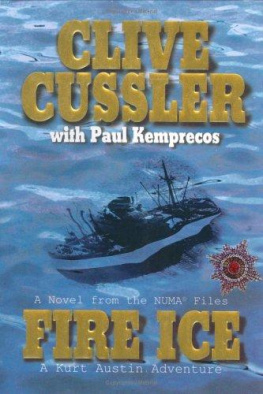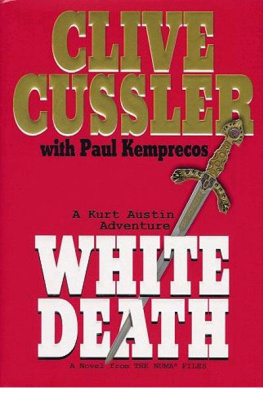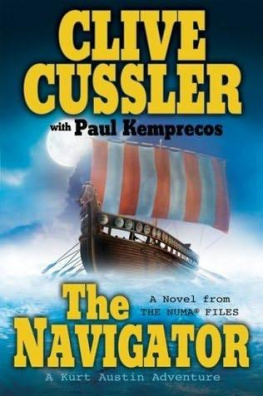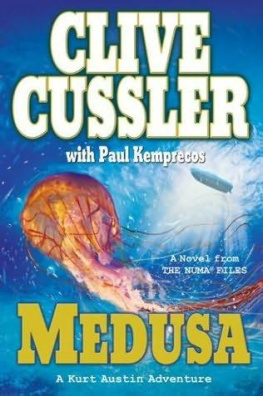The Navigator
The Numa Files
Book VII
Clive Cussler
&
Paul Kemprecos
Prologue
A FAR-OFF LAND, ABOUT 900 B.C.
THE MONSTER EMERGED FROM the morning mists in the pearly light of dawn. The massive head, with its long snout and flaring nostrils, advanced toward shore where the hunter knelt, bowstring taut to his cheek, eyes focused on a deer grazing in the marsh. A rippling sound caught the hunters ear and he glanced out at the water. He uttered a fearful moan, threw the bow aside, and leaped to his feet. The startled deer disappeared into the woods with the terrified hunter close on its tail.
The tendrils of fog parted to reveal a giant sailing ship. Curtains of seaweed fringed the vessels two-hundred-foot-long wooden hull of reddish brown. A man stood on the ships upswept stem behind the carved figurehead of a snorting stallion. He had been gazing into a small wooden box. As the ghostly shoreline materialized, the man raised his head and pointed to the left.
The helmsmen at the twin steering oars brought the ship around in a graceful turn that sent it on a new course parallel to the densely wooded shoreline. Deckhands expertly adjusted the vertically striped red-and-white square sail to compensate for the change in direction.
The captain was in his midtwenties, but the serious expression on his handsome face added years to his appearance. His strong nose was curved slightly at the bridge. His thick black beard was arranged in rows around a full mouth and square jaw. Sun and sea had tanned his skin to a mahogany hue. The unfathomable eyes that scanned the shoreline were a deep brown that was so dark the pupils were almost invisible.
The captains high station in life entitled him to wear a purple robe dyed with the valuable extract from the murex snail. He preferred to go bare-chested, and wore the cotton kilt of an ordinary crewman. A floppy, conical knit cap covered the close-cropped, wavy black hair.
The briny smell of the sea had faded as the ship left the open ocean and entered the wide bay. The captain filled his lungs with air that was redolent with the scent of flowers and green growing things. He savored the prospect of freshwater and ached to set foot on dry land.
Although the voyage was long, it had gone well, thanks to the handpicked Phoenician crew, all seasoned deepwater mariners. The crew included a scattering of Egyptians and Libyans, and others from the countries bordering the Mediterranean. A contingent of Scythian marines provided security.
The Phoenicians were the finest seamen in the world, adventurous explorers and traders whose maritime empire extended throughout the Mediterranean and beyond the Pillars of Hercules and the Red Sea. Unlike the Greeks and the Egyptians, whose ships hugged the shore and dropped anchor when the sun set, the fearless Phoenicians sailed day and night out of sight of land. With a fair wind from astern, their big trading ships could cover more than a hundred miles a day.
The captain was not Phoenician by birth, but he was well versed in the sea arts. His command of navigation and seamanship and his cool judgment during bouts of bad weather had quickly gained the crews respect.
The vessel under the captains command was a ship of Tarshish, built specifically for long-range commerce on the open ocean. Unlike the more-tubby short-haul traders, the vessels lines were long and straight. The deck and hull timbers were hewn from tough Lebanese cedar, and the thick mast was low and strong. The square Egyptian-linen sail, quilted with leather belts for strength, was the most efficient deepwater sailing rig in existence. The curved keel and upswept stem and stern presaged the Viking ships that would not be built until centuries later.
The secret behind Phoenician mastery of the sea went beyond technology. Organization aboard their ships was legendary. Each crewman knew his place in the well-oiled machinery that was a Phoenician sea venture. Rigging was neatly stowed in an easily accessible room that was the responsibility of the captains assistant. The lookout man knew the location of each piece of tackle, and constantly tested the ships rigging to make sure it would work if needed in an emergency.
The captain felt something soft brush against his bare leg. Allowing himself a rare smile, he set the wooden box in a receptacle and reached down and picked up the ships cat. Phoenician cats had their origins in Egypt where the animals were worshipped as gods. Phoenician ships carried cats as trade items and for rat control. The captain stroked the orange-and-yellow-striped cat for a few times, then gently set the purring feline back down on the deck. The ship was approaching the wide mouth of a river.
The captain called out a command to the lookout man.
Prepare the riggers to drop sail, and alert the oarsmen.
The lookout man relayed the first command to a pair of crewmen, who scrambled like monkeys up the mast to the yardarm. Two other sailors tossed lines attached to the lower corners of the sail to the riggers, who used the ropes to reef the big linen square.
Brawny-armed rowers arranged in two ranks of twenty were already at their benches. Unlike the slave rowers on many vessels, the oarsmen who powered the ship forward with quick, precise strokes were trained professionals.
The helmsmen steered the ship into the river. Although the river was swollen with spring runoff from snow melting in the hills and mountains, its shallow waters and rapids would prevent the ship from moving farther upstream.
The Scythian mercenaries lined the ships rail, their weapons at the ready. The captain stood on the prow, surveying the riverbank. He saw a grassy promontory that projected into the river and ordered the oarsmen to hold the ship against the current while the deck crew dropped anchor.
A muscular man with prominent cheekbones and a face as weathered as old saddle leather strode up to the captain. Tarsa commanded the Scythian marines who protected the ship and its cargo. Related to the Mongols, the Scythians were known for their skill as horsemen and bowmen, and for their peculiar habits.
In battle, they drank the blood of their vanquished enemies and took scalps that they used as napkins. Tarsa and his men painted their bodies red and blue, cleansed themselves with vapor baths, and wore leather shirts and trousers tucked into soft leather boots. Even the poorest Scythian adorned his clothes with gold ornaments. Tarsa wore a small horse pendant that the captain had given him.
Ill organize a scouting party to go ashore, Tarsa said.
The captain nodded. Im going with you.
A smile came to the Scythians stony face. As a landsman he had had little faith at first in the young captains ability to keep the ship afloat. But he had watched the captain command the massive ship and had seen that there was iron behind the young mans patrician features and soft-spoken manner.
The wide-bodied utility boat normally towed behind the ship was brought alongside. The Scythian and three of his toughest fighters got into the boat with the captain and two strong rowers.
Minutes later the boat bumped against the promontory with a hard, grating sound. Under the grass overgrowth was a stone quay. The captain tied the boat up to a bollard that was all but hidden by weeds.
Tarsa ordered one man to stay with the rowers. Then he set off with the captain and the other Scythians along the overgrown stone-paved road that ran inland from the quay. After weeks spent on a rocking deck, they walked with an unsteady gait but quickly recovered their land legs. A few hundred feet from the river they encountered a weed-choked central plaza lined on all four sides by dilapidated buildings. Tall grass grew in the open doorways and alleys.
Next page

